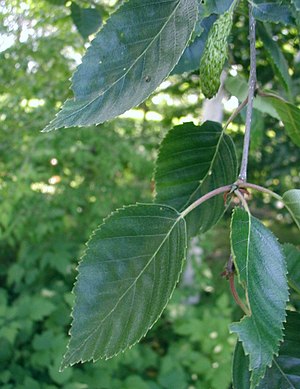Note: This is a project under development. The articles on this wiki are just being initiated and broadly incomplete. You can Help creating new pages.
Betula utilis - Bhūrjaḥ
Bhūrjaḥ is a moderate sized tree, usually with a somewhat irregular bole. It is occasionally a shrub. It found throughout the main Himalayan range ascending to an altitude of 4200 m.
Contents
[hide]- 1 Uses
- 2 Parts Used
- 3 Chemical Composition
- 4 Common names
- 5 Properties
- 6 Habit
- 7 Identification
- 8 List of Ayurvedic medicine in which the herb is used
- 9 Where to get the saplings
- 10 Mode of Propagation
- 11 How to plant/cultivate
- 12 Season to grow
- 13 Required Ecosystem/Climate
- 14 Kind of soil needed
- 15 Commonly seen growing in areas
- 16 Photo Gallery
- 17 References
- 18 External Links
Uses
Bleeding, Obesity, Hysteria, Jaundice, Relieve earache, Burns, Rheumatism, Bladder stones.
Parts Used
Bark.
Chemical Composition
Betulin, lupeol and 3 β - aetoxy - 12 - oleanen - 28 - oic acid.[1]
Common names
| Language | Common name |
|---|---|
| Kannada | |
| Hindi | Bhojapatra |
| Malayalam | Bhurjamaram |
| Tamil | Bhojapatram |
| Telugu | Bhurjapatri |
| Marathi | NA |
| Gujarathi | NA |
| Punjabi | NA |
| Kashmiri | NA |
| Sanskrit | Bhīrja Patraḥ, Mṛducchada, Bahulavalkala, Bhūrjagranathi, Carmī |
| English | Himalayan Silver Birch |
Properties
Reference: Dravya - Substance, Rasa - Taste, Guna - Qualities, Veerya - Potency, Vipaka - Post-digesion effect, Karma - Pharmacological activity, Prabhava - Therepeutics.
Dravya
Rasa
Kaṣāya, Kaṭu
Guna
Laghu
Veerya
Uṣṇa
Vipaka
Kaṭu
Karma
Vātahara, Vraṇaṣodhaka
Prabhava
Habit
Identification
Leaf
| Kind | Shape | Feature |
|---|---|---|
| Paripinnate | Oblong | Leaf Arrangementis Alternate-spiral |
Flower
| Type | Size | Color and composition | Stamen | More information |
|---|---|---|---|---|
| Unisexual | 2-4cm long | pink | Flowering throughout the year and In terminal and/or axillary pseudoracemes |
Fruit
| Type | Size | Mass | Appearance | Seeds | More information |
|---|---|---|---|---|---|
| oblong pod | Thinly septate, pilose, wrinkled | seeds upto 5 | Fruiting throughout the year |
Other features
List of Ayurvedic medicine in which the herb is used
Where to get the saplings
Mode of Propagation
How to plant/cultivate
Seed - best sown as soon as it is ripe in a light position in a cold frame. Only just cover the seed and place the pot in a sunny position. Landscape Uses:Specimen. Succeeds in a well-drained loamy soil in a sheltered position. Grows well in heavy clay soils. Dislikes wet soils. Shade tolerant.[3]
Season to grow
Required Ecosystem/Climate
Kind of soil needed
Commonly seen growing in areas
Moist hillsides, Forests at the upper height.
Photo Gallery
References
- Jump up ↑ The Ayuredic Pharmacopoeia of India Part-1, Volume-5, Page no-33
- Jump up ↑ [Morphology]
- Jump up ↑ Cultivation detail
- Jump up ↑ Cite error: Invalid
<ref>tag; no text was provided for refs namedSeason to grow - Jump up ↑ Cite error: Invalid
<ref>tag; no text was provided for refs namedRequired Ecosystem/Climate
External Links
- Pages with reference errors
- Ayurvedic Herbs known to be helpful to treat Bleeding
- Ayurvedic Herbs known to be helpful to treat Obesity
- Ayurvedic Herbs known to be helpful to treat Hysteria
- Ayurvedic Herbs known to be helpful to treat Jaundice
- Ayurvedic Herbs known to be helpful to treat Relieve earache
- Ayurvedic Herbs known to be helpful to treat Burns
- Ayurvedic Herbs known to be helpful to treat Rheumatism
- Ayurvedic Herbs known to be helpful to treat Bladder stones
- Herbs with Bark used in medicine
- Herbs with common name in Hindi
- Herbs with common name in Malayalam
- Herbs with common name in Tamil
- Herbs with common name in Telugu
- Herbs with common name in Sanskrit
- Herbs with common name in English
- Habit - Tree
- Index of Plants which can be propagated by Seeds
- Herbs that are commonly seen in the region of Moist hillsides
- Herbs that are commonly seen in the region of Forests at the upper height
- Herbs
- Betulaceae
